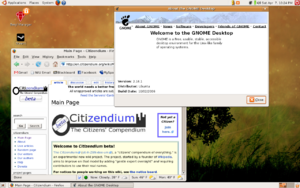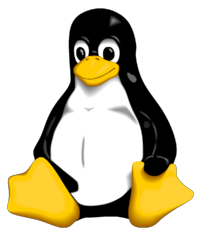Linux (operating system): Difference between revisions
imported>Joshua David Williams (changing the format a bit) |
imported>Joshua David Williams No edit summary |
||
| Line 32: | Line 32: | ||
[[Image:Linux_Tux_Logo.png|thumb|200px|right|[[Tux]] the penguin, the Linux mascot]] | [[Image:Linux_Tux_Logo.png|thumb|200px|right|[[Tux]] the penguin, the Linux mascot]] | ||
'''Linux''' is, in its most general sense, [[open source software|open source]] [[operating system]]. | '''Linux''' is, in its most general sense, [[open source software|open source]] [[operating system]]. It is [[Unix-like]] in the sense that the files are organized in a hierarchal [[file system]] and the average user is distinguished from the administrative accounts by an implementation of a very strict, yet capable set of permissions; thus, it is often considered to be a very secure system. | ||
Linux was started in 1991 by a Finnish college student named [[Linus Torvalds]]. At the time, the majority of [[Unix]] systems were very expensive. The only affordable workstation environment was a proprietary system called [[Minix]]. Although the source code was included with this system, the license fee was still a bit pricey, and it was not as good as the systems the workstations in the universities were running. | Linux was started in 1991 by a Finnish college student named [[Linus Torvalds]]. At the time, the majority of [[Unix]] systems were very expensive. The only affordable workstation environment was a proprietary system called [[Minix]]. Although the source code was included with this system, the license fee was still a bit pricey, and it was not as good as the systems the workstations in the universities were running. | ||
Revision as of 20:56, 23 April 2007
| Linux |

|
| The GNOME desktop on Ubuntu Linux 6.10 |
| Website: http://www.linux.org (unofficial) |
| Developer: The Open Source community |
| OS family: Unix-like |
| Source model: Open source |
| Supported platforms: x86, x86-64, ia64, DEC Alpha, Motorola 68k, SUN Sparc, ARM, PowerPC |
| Kernel type: Modular monolithic |
| Default user interface (most distros): GUI |
| License: GNU General Public License |
| Working state: Current |

Linux is, in its most general sense, open source operating system. It is Unix-like in the sense that the files are organized in a hierarchal file system and the average user is distinguished from the administrative accounts by an implementation of a very strict, yet capable set of permissions; thus, it is often considered to be a very secure system.
Linux was started in 1991 by a Finnish college student named Linus Torvalds. At the time, the majority of Unix systems were very expensive. The only affordable workstation environment was a proprietary system called Minix. Although the source code was included with this system, the license fee was still a bit pricey, and it was not as good as the systems the workstations in the universities were running.
The name
GNU/Linux controversy
By strict definition, it is rarely seen by the user, because its job is to be a layer between the user environment and the hardware.